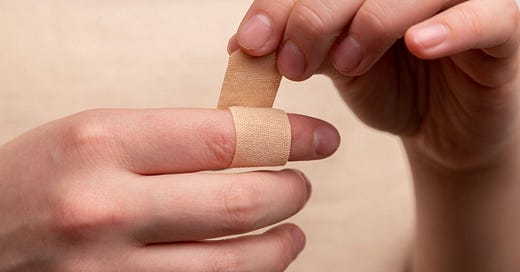1.
“Our bodies were made for healing.” His tiny voice pipes up over the bathroom counter.
I press a bandaid on his still-baby-soft skin as he shows me the faintest scar from his last fall, what this latest wound will become. Despite the pain of the present moment, there are few things a parent loves more than proof that your kids were listening, and nothing swells a theologian’s heart like a deep divine truth. So I pause while wiping his tears and smile down at him.
“You know that, don’t you? God made our bodies to heal. How amazing is that?”
I have said the same words to my children a thousand times in the past two years. As my hair fell out in clumps, then sprouted back in fuzzy curls. As my body was wrapped in hospital bandages, then unwrapped tenderly. As my wounds oozed blood, then closed with pale scars.
Our bodies were made to heal. Even in the midst of suffering, we can marvel at this mystery.
2.
Later that week, another child asks quite seriously if human limbs can grow back like starfish.
No, I say, stifling a laugh, because the question is real and the plausibility is understandable: if it works for one part of nature, why not another?
Wild animals lick their wounds to help them heal. Certain monkeys will gather plants or insects to rub on scratches and sores. Trees care for each other during drought and disease. Our collective body, too, is capable—albeit rarely—of help and healing, of truth and reconciliation. These might be rare in our society, but so are northern lights and we cling to these, shimmering in the dark, glowing in cosmic colors found nowhere else. A rare beauty we witness together.
I have healed from every broken heart, broken bone, scraped knee, bruised leg, sore throat, stomach bug, and common cold I’ve ever had. More will come, and they too shall pass. Will cancer come back? Stubborn hope is stitched into skin now, my own strength hardened into scars. I stare at the mutilated torso in the mirror, and it radiates with second chances. This broken, bruised body is the one I get for the second half of life. (May it be long, Lord. May it be.)
We never hear a word from Lazarus in the Gospels, but he rises in my mind daily now. How some friends must have scattered, repulsed or repelled, while others drew closer than ever. How he watched others die after him and realized what would come for them, too. How he walked out of his tomb still wrapped in death’s shrouds, needing others to set him free.




